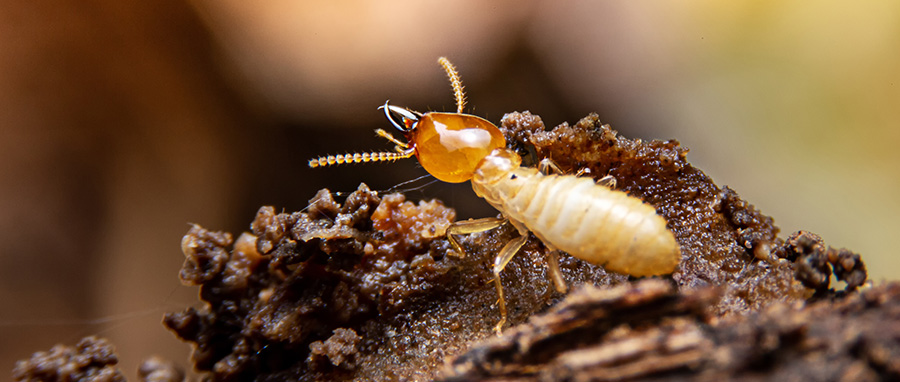If you deal with pests during the summer, you might breathe a sigh of relief when the winter weather rolls in. Cockroaches, wasps, and other critters are typically less active when it’s cold out. Termites, however, are a completely different story—while you may not find termites outside often in the winter, they are still active and dangerous no matter the season.
Where Do Termites Go In The Winter?
During the winter months, homeowners may wonder where termites go and if they remain active. Unlike some pests that become dormant in cold weather, termites do not hibernate. Instead, they adapt their behavior to survive the colder temperatures.
Subterranean termites, the most common type found in many regions including here in Spokane, WA and Coeur d'Alene, ID, typically tunnel deeper into the soil to find warmth during winter. Additionally, termites may seek refuge in the insulated confines of homes, where they can still thrive despite the chilly weather outside.
While termites may not be as visible during the winter months, they can continue to pose a significant threat to homeowners. Rather than foraging on the surface or building conspicuous mud tubes, termites may tunnel deeper into the wood of a structure, where they can cause extensive damage unseen.
This behavior can be particularly concerning for homeowners, as termite infestations may go unnoticed until significant damage has already been done. Even though termites may not be actively swarming or visible in winter, their presence can still lead to costly repairs and structural issues.
Do Termites Lay Eggs In Cold Weather?
Though termites lay fewer eggs in cold temperatures, they still continue to reproduce. The queen increases the size of her colony by laying eggs all throughout the year, including winter. Unfortunately, if these pests wander indoors, they won’t be exposed to normal winter weather and may not slow down their reproduction rate at all.
Preventing Termites in Winter
While termites may alter their behavior during the colder winter months, it’s essential for homeowners to remain vigilant in preventing infestations. Here are some prevention tips to help you keep termites at bay even when temperatures drop:
- Maintain Proper Ventilation and Reduce Moisture: Termites are attracted to moisture-rich environments. Ensure proper ventilation in crawl spaces, attics, and basements to reduce humidity levels. Fix leaks promptly and address any moisture issues around plumbing fixtures, HVAC units, and the foundation.
- Keep Wood Away from the House: Firewood, lumber, and mulch should be stored away from the exterior of your home. Termites are drawn to wood, and having it in close proximity increases the risk of infestation. Store firewood at least 20 feet away from your house and inspect it regularly for signs of termite activity.
- Seal Cracks and Crevices: Inspect the exterior of your home for any cracks or gaps where termites could gain entry. Seal these openings with caulk or another appropriate sealant to prevent termites from accessing your home’s interior.
- Use Termite-Resistant Materials: When building or renovating your home, opt for termite-resistant materials whenever possible. Pressure-treated wood, concrete, and steel are less susceptible to termite damage and can help deter infestations.
- Install Physical Barriers: Consider installing physical barriers, such as metal mesh or termite shields, around the foundation of your home. These barriers can prevent termites from accessing the structure and provide an additional layer of protection.
- Monitor and Maintain Landscaping: Trim shrubs, trees, and bushes away from the exterior of your home to eliminate potential pathways for termites. Keep landscaping mulch thin and away from the foundation to reduce moisture retention and termite attraction.
- Schedule Regular Inspections: Arrange for annual termite inspections conducted by a licensed pest control professional. Regular inspections can detect early signs of termite activity, allowing for prompt treatment before infestations worsen.
How To Check For Termites In The Winter
Identifying a termite infestation isn’t easy no matter what time of year it is. As temperatures drop and they burrow deeper into wood, it’s even more challenging to spot an infestation. Even in the winter, keep an eye out for these signs of a termite infestation:
- Mud tubes
- Piles of frass
- Peeling paint
- Squishy floors
- Discarded wings
- Live or dead insects
Since it can be incredibly difficult to tell if you have a termite problem, it’s also helpful to invest in regular inspections. Licensed professionals have advanced tools to help them identify pest problems that are happening deep inside your walls. Investing in a termite inspection before or after winter can help you avoid the damage that these pests can cause.
Keep Termites Out Of Your House All Year Long
The last thing you need is to have termites chewing through your walls. Whether you think you have a termite problem or just want peace of mind against these pests, Eden Advanced Pest Technologies can help. Our expert team at Eden Advanced Pest Technologies is here to provide comprehensive termite prevention and control solutions tailored to your needs. Call us today and safeguard your home against termite infestations all winter long.
Back to Termite Exterminators & Control

